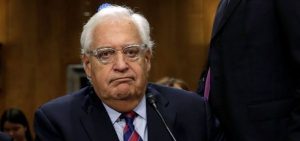Reading Between the Hardlines

Mere days after senior Hamas operative Muhammad Hemada Walid al-Quqa blew himself up preparing a bomb, The New York Times noted, in a recent front page story about the Muslim Brotherhood, that “some of [its] offshoots – most notably Hamas – have been tied to attacks.”
“Tied to”?
That phrase would seem to imply some tenuousness or doubt. In reality (which, despite “alternate facts,” still exists), Hamas has been openly attacking and murdering Israeli civilians and soldiers since 1987, demonically celebrating its every “success.”
A study published in 2007 by the Journal of Economic Perspectives, an apolitical academic publication, found that, of the scores of Palestinian suicide bombings that took place from September 2000 through August 2005, 39.9 percent were carried out by Hamas. (The repugnant runner-up was Fatah, at 25.7 percent.) And then there are the rockets that have rained down on Israel from Gaza in more recent years.
As to the Muslim Brotherhood, which, as the paper of record records, hatched Hamas, while it has been trying to present a more pleasant face of late, one of its mottos is more telling: “Jihad is our way; death for the sake of Allah is our wish!”
Several days after The Times referred to the Brotherhood’s spawn as merely “tied to” attacks on Jews, Hamas chose a new leader in Gaza, Yehya Sinwar.
Mr. Sinwar was sentenced decades ago in Israel to four life terms for the murder of Palestinians he suspected of collaboration with Israel. According to Israeli security experts, he also played a pivotal role in the planning and execution of attacks against Israeli soldiers.
The new Hamas leader was also one of the founders of Al Majd (“Glory”), a precursor of Hamas’s military wing, Izz al-Din al-Qassam Brigades.
After serving more than 20 years in jail, Sinwar was released in 2011, one of the 1,000 Arab prisoners exchanged for captured Israeli soldier Gilad Shalit.
The Times, along with many media (the BBC, CNN, the Washington Post, Huffington Post, The Guardian and ABC News, among others) referred to Sinwar as “hardline” or a “hardliner.” While that description isn’t inaccurate (“hardliner” meaning “a person who adheres rigidly to a dogma, theory, or plan”), some other adjective might have been more informative, something, perhaps, like “convicted murderer.”
Interestingly, as it happened, another “hardliner” was in the news, too, last week: David Friedman, President Trump’s designate for ambassador to Israel. That was the word used by many of the very same media noted above to describe Mr. Friedman.
Mr. Friedman has not, to anyone’s knowledge, ordered the murder of anyone, or founded a terrorist group. His hardliner-ness consists of his past skepticism about a two-state solution to the Israel-Arab conflict and various intemperate statements he made about Jews and others who he feels have advocated for Palestinians to the detriment of Israel.
Last Thursday, the Senate Foreign Relations Committee grilled the nominee. In light of some of Mr. Friedman’s earlier statements, I was prepared to be uninspired. But the give-and-take between Mr. Friedman and his Senatorial inquisitors left me, instead, impressed. Deeply so.
Mr. Friedman was composed (even when pro-Palestinian activists obnoxiously interrupted the hearing, shouting slogans – one, righteously blowing a shofar – before being escorted out of the room by security personnel), eloquent, thoughtful, fair-minded and – most impressively – willing, under oath, to publicly and without reservations, renounce the extreme things he had said or written as a private citizen.
“While I maintain profound differences of opinion with some of my critics,” he said, “I regret the use of [harshly insulting] language.”
Asked by New Jersey Senator Cory Booker if he believes, as he had once seemed to say, that former president Obama is in fact an anti-Semite, Mr. Friedman, without hesitation, replied: “Not at all. I don’t believe that for a second.” (Halevai other erstwhile Obama-defamers would own up to their own excesses.)
Pressed repeatedly (and disturbingly – just how many apologies were required?) by various senators to address the issue of his past statements, Mr. Friedman didn’t get upset. Nor did he offer the typical politician’s “non-apology apology.” He stated clearly and forthrightly: “There is no excuse. If you want me to rationalize or justify [the words I used], I cannot. I regret [them].”
Mr. Friedman proudly and convincingly expressed his desire to fortify the American-Israel relationship, and demonstrated that he has no animus for Arabs and wants to see peace between Israel and the Arabs in her midst.
Of course, and unfortunately, many obstacles stand in the way of that goal. Prime among them, his “fellow” hardliner in Gaza and the all-too-many others like him.
© 2017 Hamodia


Recent Comments